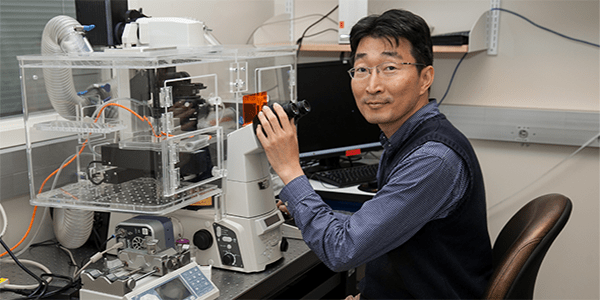UW Bioengineering Assistant Professor of Bioengineering Dr. Deok-Ho Kim has received a $1.7 million, five year NIH R01 grant to develop tissue engineered human neuromuscular junctions for modeling axonal neuropathy. In this project, Dr. Kim and colleagues will apply novel stem cell and tissue engineering strategies to investigate underlying etiology of a common debilitating peripheral neuropathy (Charcot-Marie-Tooth disease; CMT).
CMT (especially CMT type 2; CMT2) is a condition characterized by the breakdown of axons in the neurons responsible for relaying signals from the nervous system to the musculature. Progressive breakdown of the synaptic connections these cells form with muscle cells leads to muscle wasting, paralysis, and death. Affecting roughly one in 2,500 people, the condition is incurable and very few palliative treatments are available.Additionally, the variety of patient mutations leading to this disease makes generating effective treatments challenging. The aim of this project is to generate neurons from CMT patient derived stem cells and use them to model synaptic breakdown. By comparing common features between patient cells carrying different mutations, Dr. Kim’s group hopes to identify suitable targets for new therapies to help alleviate symptoms in patients.
“We are extremely excited,” says Dr. Kim. “This award is an opportunity to develop a novel disease-in-a-dish model for investigating peripheral neuropathies. Given the limitations of animal models to accurately model human genetic disorders, our technology might enable a greater understanding of the mechanisms underpinning numerous peripheral neuropathies, as well as provide a valuable tool for screening new potential therapies.”
In this project, Dr. Kim’s lab will collaborate with Dr. Mark Bothwell, a professor of physiology and biophysics at the UW with extensive experience in neuron physiology and pathology. Drs. Kim and Bothwell will also collaborate with Dr. Byung-Ok Choi at the Samsung Medical Center in South Korea, whose extensive library of CMT patient stem cell lines and experience with affected patients will be invaluable in achieving the goals of this grant.
Dr. Kim directs The Multiscale Biofabrication and Tissue Engineering Lab, which develops functional tissue engineering models for regenerative biology, drug screening, disease modeling and stem cell-based therapies. His group aims to create biomimetic functional models of human tissues that enhance our understanding of structure-function relationships, and increase the utility of in vitro models for driving new therapies to the clinic. This new award represents a new research focus in the Kim lab: looking at integrating multiple cell types (neurons and muscle) into a single platform to enhance functional performance in neuromuscular tissues.


